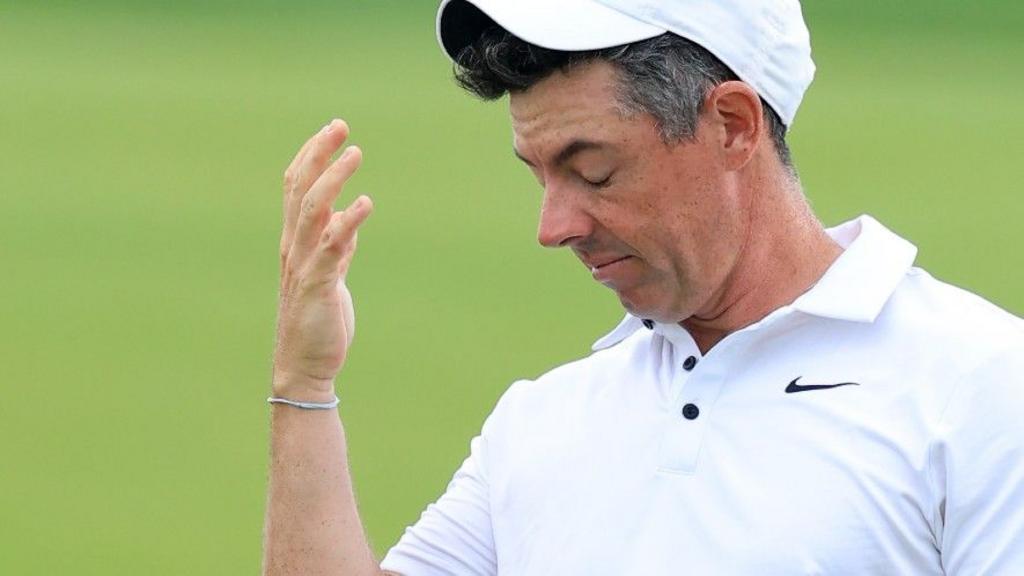This video cannot be played.
Watch: Rory McIlroy speaks after his final round at the US Open.
Despite the numerous storylines emerging from the 125th US Open at Oakmont, Rory McIlroy remained a central figure in post-tournament discussions.
The Masters champion didn’t contend on the challenging course, where JJ Spaun secured a dramatic victory with a remarkable final putt.
British golfers Robert MacIntyre and Tyrrell Hatton emerged as significant contenders, showcasing their skills on a course that yielded a surprising leaderboard going into the final round, featuring only one previous major winner in the top 10.
On a rain-soaked final day, Spaun overcame a difficult start to claim victory, while players like Adam Scott and Sam Burns experienced considerable struggles.
However, conversations in Pittsburgh and beyond continued to revolve around the 36-year-old Northern Irishman, who completed the career Grand Slam at the Masters in April.
This video cannot be played.
Watch: A frustrated McIlroy asserts, “I’ve earned the right to do whatever I want.”
McIlroy’s demeanor sparked much speculation, particularly after his terse press conference following the third round. It marked his first post-round major media appearance since his joyous Masters win.
He had previously remained silent to the media after each round of last month’s US PGA Championship, following reports that his driver failed a conformity test at Quail Hollow due to wear. While not inherently problematic, the disclosure of confidential test results angered him, particularly as it failed to mention Scottie Scheffler’s driver also failed.
This unprecedented silence throughout a major fueled further intrigue.
While he spoke on the Tuesday before the US Open, his responses were noticeably short and tense, especially regarding the driver issue.
This somber attitude contrasted sharply with the expectations surrounding his recent Grand Slam achievement.
While the Grand Slam is a monumental accomplishment, it doesn’t guarantee perpetual happiness. The post-celebration period presented new challenges.
McIlroy aims to ‘climb another mountain’ at Portrush
Spaun wins US Open with final birdies, edging MacIntyre
McIlroy: “I’ve earned the right to do whatever I want”
The question arises: how does one move forward after achieving a lifelong goal? What motivates continued dedication and self-reflection?
“Physically, my game is there; it’s the mental aspect of getting in the right mindset to perform my best,” McIlroy explained after his Sunday 67 at Oakmont.
This was the joint-lowest score on the final day. His more open communication stemmed less from improved play and more from his audience.
Unlike the previous day, only a few reporters—from BBC Northern Ireland and Irish press—were present, individuals who have followed his career closely.
This familiarity fostered a more candid conversation. He admitted, “I climbed my Everest in April, and after that, you have to come down and find another mountain to climb.”
In contrast, the previous day’s swarm of primarily American reporters elicited a cold and curt response. His “I’ve earned the right to do whatever I want” comment appeared entitled and arrogant, despite relating to media interactions.
Unlike sports like football or tennis, post-round interviews in golf are voluntary. McIlroy exercised this right, prompting debate among golf administrators and broadcasters.
Collin Morikawa’s similar actions after the Arnold Palmer Invitational, stating “I don’t owe anyone anything,” highlight a potential trend. This attitude, from a player with earnings nearing $50 million, raises questions.
Mandating interviews would be challenging for tours largely governed by players. However, major championship organizers (Augusta National, PGA of America, USGA, and R&A) might consider making media availability a condition of participation.
This is particularly relevant given the perceived widening gap between top players and the media, crucial for maintaining public image and financial success.
Increased wealth appears correlated with reduced accessibility and increased temperamental outbursts. Recent majors witnessed angry outbursts from several players, including world number one Scottie Scheffler.
McIlroy, while not the primary offender, exhibited uncharacteristic behavior, including throwing a club and damaging a tee marker. This behavior, from golf’s leading ambassador, is concerning.
His frustrations were understandable, fueled by “driver-gate” and perceived disrespect towards Jack Nicklaus regarding the Memorial Tournament.
His struggles with his driver, despite his extraordinary achievements, showcased his humanity. He reached a breaking point, a relatable experience.
While his post-round silence was understandable, his subsequent comments weren’t ideal, but could potentially mark a turning point.
By the end of the week, his driver’s performance improved, a key component of his success.
On Sunday, his usual self emerged, discussing his upcoming return to Europe, a new house at Wentworth, and the Open at Royal Portrush.
After this week’s Travelers Championship, he’ll take a break before the Scottish Open and the Open Championship. His improved demeanor is expected.
This video cannot be played.
Spaun secures US Open victory with the week’s longest putt.
Comments cannot be loaded.
To load comments, please enable JavaScript in your browser.

